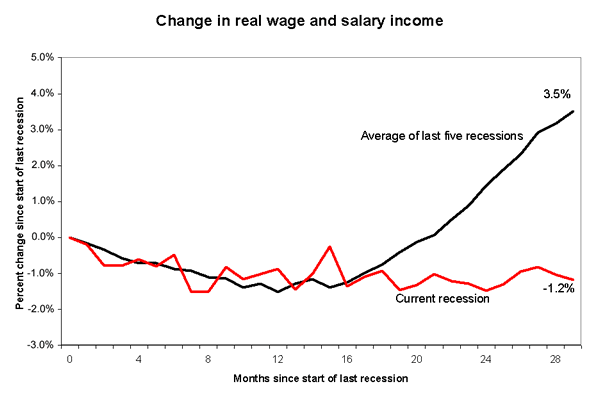Snapshot for October 29, 2003.
Still no recovery in wage and salary income
The fact that jobs have declined by 2.7 million since the start of the last recession is well known. One important consequence seems to have escaped notice—a contraction in real wage and salary income, as declines in both jobs and hours per job over the last 29 months have more than offset gains in real hourly pay. Spending by consumers has grown only because of increased household borrowing (particularly cash-out refinancing), improved property income, and lower income taxes, but a sustained, self-reinforcing growth cycle cannot occur without a recovery in jobs that allows wage and salary income to grow.
Real wage and salary income declined by 1.2% between the start of the last recession (March 2001) and the most recent month of data (August 2003). That decline is the worst performance at this stage since the current data series began in 1959. Since 1959, there have been five cycles in which the recession and expansion together lasted at least 29 months. Real wage and salary income gained an average of 3.5% by the 29th month after those five recessions began. Wage and salary income remained in negative territory only once before at this stage: 29 months after the 1973 recession, wage and salary income remained down by 0.5%.

For the first 18 months into this cycle, wage and salary income declined at a pace similar to the average of the prior five cycles (see figure). By that point in other cycles, real wage and salary income had typically started to grow strongly. In the current cycle, however, real wage and salary income has continued to stagnate for another year and even dropped in the most recent two months (from June to August).
Consumption and gross domestic product (GDP) are currently getting an enormous boost from greater defense spending for the war in Iraq, tax cuts, and a temporary spike in mortgage activity for new homes and refinancing. Those stimuli will soon fade. Unless employers start hiring and increasing their real wage and salary payments, the current spurt in consumption will subside.
Source: EPI analysis of Bureau of Economic Analysis data.
This week’s Snapshot was written by EPI Research Director Lee Price with research assistance from Yulia Fungard.
Check out the archive for past Economic Snapshots.
